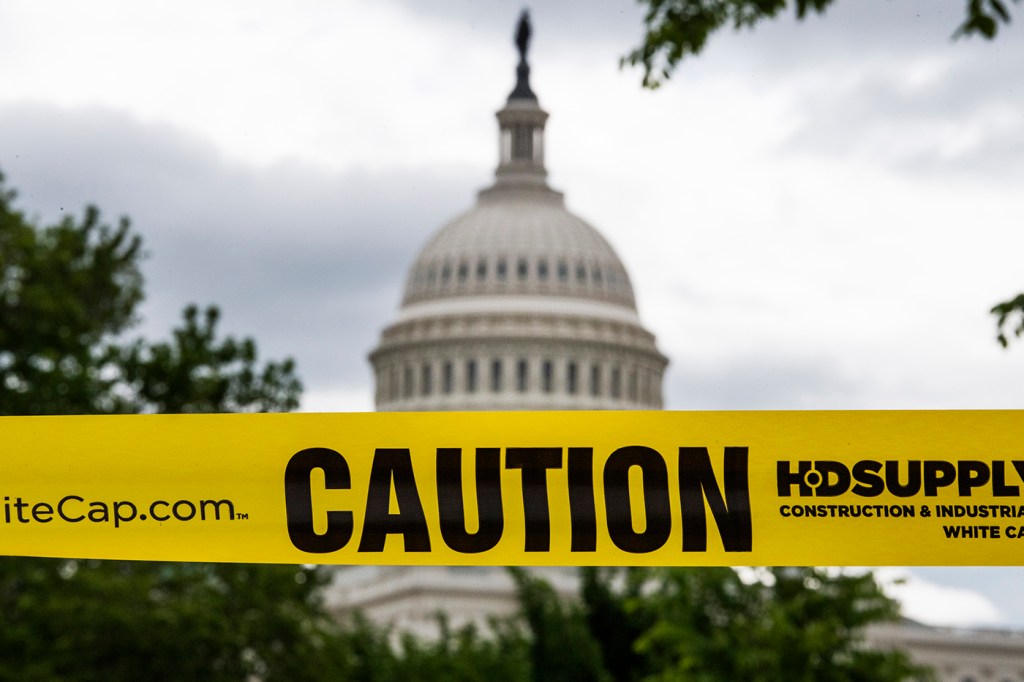What is a constitutional crisis?
With Trump waiting in the wings, could we
be heading toward one?
“This is one of those essentially contested concepts without a fixed definition,” says Dan Urman, director of the law and public policy minor at Northeastern, who teaches courses on the Supreme Court.

From the dispute at the southern border between Texas officials and the Biden administration, to the prospect of a second Donald Trump presidency, the phrase constitutional crisis has found its way into many headlines lately.
While modern crises pose dangers that are clearly defined, others are subject to interpretation, such as what is meant when reporters casually invoke the failure of the institutions of government to keep the wheels of democracy greased. Rolling Stone did so earlier this year, declaring with ominous certainty, in anticipation of Trump’s clash with state and federal prosecutors: “America is facing its greatest constitutional crisis since the Civil War.”
“This is one of those essentially contested concepts without a fixed definition,” says Dan Urman, director of the law and public policy minor at Northeastern, who teaches courses on the Supreme Court.
Political officials and commentators frequently warned of a constitutional crisis during the Trump years — first, in response to some of his policies; then throughout congressional impeachments hearings; and, finally, when the former president allegedly mounted a campaign to overturn the results of the 2020 election. The term has re-entered public discourse as Trump, who is the presumptive Republican nominee for president, faces a slew of state and federal charges.
Northeastern legal experts say that, though real-world examples are often contested, the concept of a constitutional crisis generally describes a situation in which a political dispute cannot be resolved within the system of rules, norms and procedures that govern society.
“In general, it relates to an inability of our governmental institutions to resolve problems in a legal or democratic way within the constitutional system,” Urman says.

Types of crises
The U.S. Constitution is supposed to provide a framework for resolving disputes through doctrines such as the separation of powers. A constitutional crisis occurs when the system of “checks and balances” breaks down without clear recourse, and the issue at hand then “spills over,” rendering the institutions incapable of resolving the dispute, Urman says. Scholars, pointing to events throughout history, have delineated several categories of constitutional crises.
When President William Henry Harrison died just one month into his tenure in 1841, a constitutional crisis ensued over the exact procedure for installing his successor. It wasn’t until 1967, with the ratification of the 25th Amendment, that a process was put in place to clarify what had previously been constitutionally ambiguous.
Constitutional vagueness can lead to one kind of crisis. Another is when the Constitution offers solutions to a problem, but they can’t be implemented because they are politically infeasible. This was the case during the 2000 presidential election, when a dispute over vote tallies in Florida was kicked up to the Supreme Court despite constitutional remedies. (While the authority to determine a winning candidate rests with the House of Representatives in the case of a dispute, scholars note that constitutional rules governing presidential elections still must be “interpreted and supplemented.”)
The high court ultimately handed the presidency to George W. Bush, ending a possible crisis (scholars have debated whether Bush v. Gore constituted an actual constitutional crisis) that left a stain on the democratic process.
Near-crises
The beginnings of crises seemed to rear their head during the tumult of the 2010s, Urman says. Take U.S. Sen. Mitch McConnell’s refusal to hold a hearing for Merrick Garland, who then-President Barack Obama nominated to the Supreme Court in 2016 at the tail end of his presidency following the death of Justice Antonin Scalia.
While many scholars protested the move, saying that Garland was owed a hearing, Republican senators still effectively stonewalled the nomination, clearing the way for the appointment of Justice Neil Gorsuch when Trump took office.
The dispute, however, was not a crisis, according to Urman.
“McConnell was playing constitutional hardball,” he says. “He was allowed to do this even though norms and past practices suggested Garland deserved, at the very least, a Senate hearing.”
Jeremy R. Paul, a professor of law and former dean of the Northeastern University School of Law, agrees.
“What made it not a crisis is precisely that Obama backed down,” Paul says. “McConnell said he wasn’t going to hold a hearing, and Obama went and jaw-boned about it, which is to say, he complained about it; he talked to the public about it; but he didn’t say, ‘Well, we’re just going to seat him anyway.’”
A constitutional crisis usually refers to a defined moment, Urman says. The Civil War — itself perhaps the founding constitutional crisis — is a notable example. President Andrew Jackson refusing to follow the Supreme Court ruling in Worcester v. Georgia in 1832, which recognized Cherokee sovereignty above Georgia state law, is another. “The president didn’t abide by a Supreme Court ruling,” Urman says, “a clear crisis.”
When President Richard Nixon refused to hand over audio recordings of some of his phone conversations to the special prosecutor in the Watergate scandal, a constitutional crisis loomed. But after the Supreme Court ordered that Nixon do so, he complied. Crisis averted, Urman says.
“A president refusing to abide by court orders to comply with a subpoena would, in my view, be a constitutional crisis,” Urman says. “Nixon complying is what kept it from becoming a crisis. All of the other branches will have weighed in.”
Featured Posts
Crises and crises in the making
On Jan. 6, 2021, an incensed mob of Trump supporters stormed the U.S. Capitol building at the outgoing president’s urging, many chanting “stop the steal” in reference to Trump’s efforts to reverse the 2020 election outcome. Trump’s fake elector scheme — deemed illegal by his own White House Counsel’s Office — set the stage for a potentially unprecedented constitutional crisis.
“The paradigmatic example of a crisis would have been if Trump had succeeded in getting the Secret Service to take him into the Capitol, and he’d marched into the Capitol and said: ‘I hereby declare you can’t count the electoral votes.’” Paul says.
But the plan required that former Vice President Mike Pence acquiesce to Trump, and Pence’s refusal to go along with the plan, using the false slates to derail the certification process, put an end to the near-crisis. “Ultimately, Vice President Pence’s decision to certify the electoral college count averted a true crisis,” Urman says.
As the Supreme Court now weighs whether Trump should enjoy presidential immunity from prosecution — including for acts alleged in pending criminal indictments — the specter of crisis looms large. If the Supreme Court were to remain mute on the matter of immunity or rule against the former president, and Trump were to be convicted on state or federal charges of election interference, then elected president in 2024, the country may be facing a crisis, the experts say.
It’s that exact possibility that has many observers animated with concern.
“I don’t think we are currently in a crisis, but we could be if Trump recaptures the presidency and refuses to abide by court rulings,” Urman says.
Crises between federal and state government
Another crisis moment is Texas Gov. Greg Abbott’s legal standoff with the Biden administration at the southern border.
After a Supreme Court granted a request by the Biden administration to let federal border agents take down a concertina wire barrier, Abbott appeared to defy the order. The day after the Supreme Court lifted the lower court order barring Border Patrol from taking down Texas’ makeshift fence, Texas National Guard and state troopers continued erecting the razor wire.
Abbott justified the move, saying that the state has a constitutional right to defend itself from what he characterized as “invaders” south of the border.
“President Biden has violated his oath to faithfully execute immigration laws enacted by Congress,” Abbott said this year, according to the Texas Tribune. “Instead of prosecuting immigrants for the federal crime of illegal entry, President Biden has sent his lawyers into federal courts to sue Texas for taking action to secure the border.”
The episode appears to contain the hallmarks of a constitutional crisis.
“The moment you hit a crisis is when you have two of the branches of government that have conflicting views about what should happen, and neither one of them is willing to back down,” Paul says, adding that the federal government’s impasse with a state government qualifies as well.











